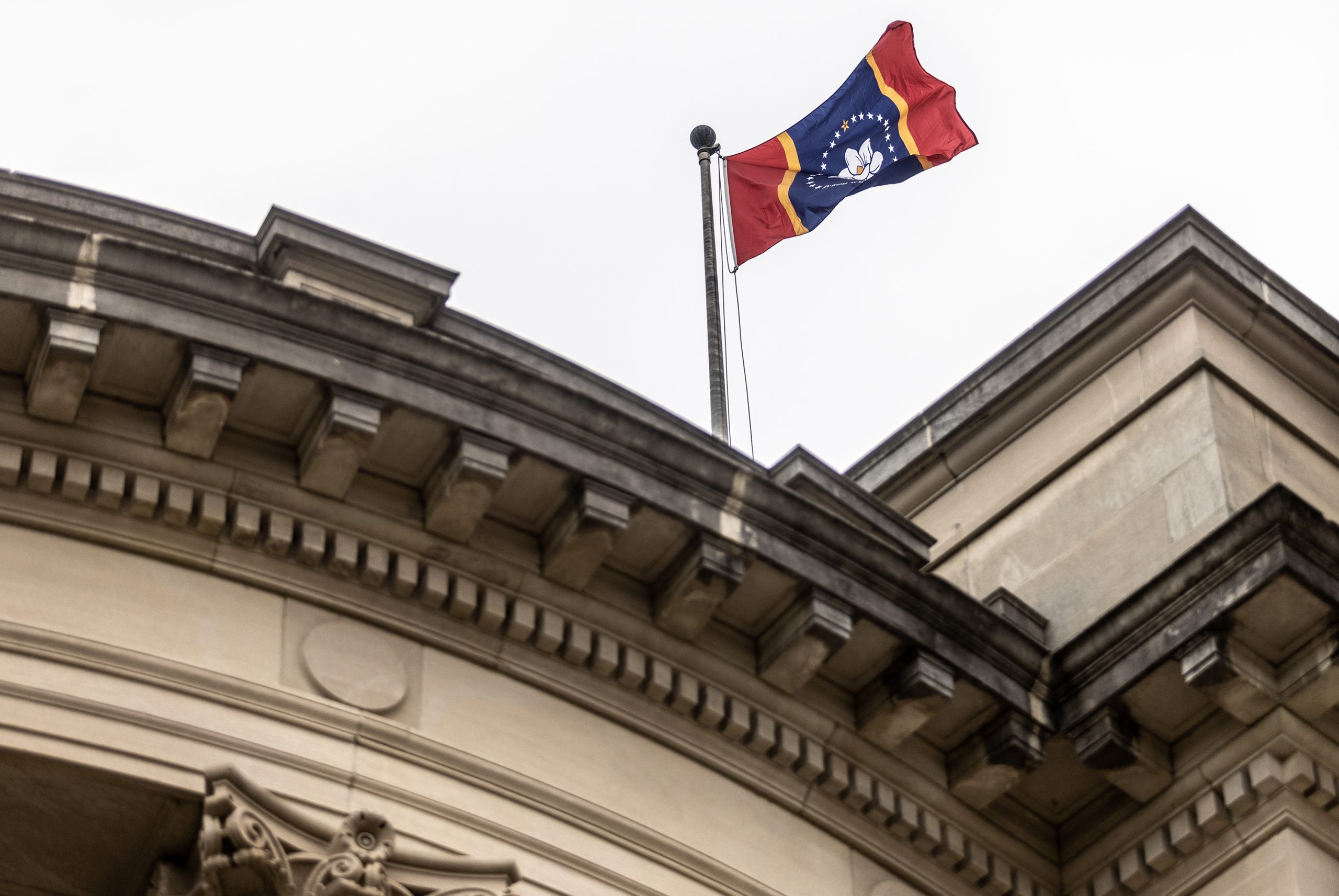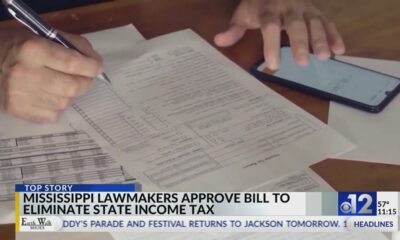Mississippi Today
Lawmakers ponder stripping state retirement system authority after board votes to raise rates

Lawmakers ponder stripping state retirement system authority after board votes to raise rates
After Public Employees Retirement System Board of Trustees voted to require an additional $345 million annually from state and local governmental entities to fund the pension plan for their current and former employees, lawmakers are considering changes to the system’s authority.
The PERS board voted in December to increase the employer contribution rate, which is paid by state governmental agencies, school districts, county and city governmental entities. The current government contribution is 17.4% of the employees’ paycheck. The board voted to increase the rate to 22.4%.
Ron Higgins, PERS executive director, said the increase is needed to ensure the system is properly funded long-term.
The increase means state agencies will have to provide an additional $265 million toward their employees’ retirement, and local governmental entities will have to provide the rest. If more money is not appropriated by the Legislature to pay for the increase, the state agencies, university and community colleges and local school districts will have to make cuts in other areas so they can meet the mandate of the PERS Board. Local governmental entities also are required to provide the funds for the increase. Under current law, the Legislature cannot prevent the employer increase from going into effect.
A bill is pending in the Legislature, though — House Bill 605 — that could be used to give the Legislature final authority over whether to enact such an increase. Legislators have expressed frustration this year with the PERS board’s decision to increase the employer contribution rate.
When asked if he planned to bring the bill up for consideration before the full chamber, House Appropriations Chair John Read, R-Gautier, said, “All I can say is the bill is on the calendar. It is out there. It might need some more research.”
During a recent meeting, Senate Appropriations Chair Briggs Hopson, R-Vicksburg, said he understands the need to ensure the pension plan is properly funded, but also expressed concern that the actions of the PERS Board have “a direct impact on the state agencies and programs and opportunities for other people to have jobs and salaries and not get laid off and have cuts in a number of areas.”
Higgins, the executive director of PERS, said, “We just have to make sure it is fiduciary (and) that the system is funded property.” Higgins said the board postponed recommendations of its financial experts to increase the rates in earlier years because of the impact it would have on state and local budgets.
But he said under state law, the only option the board has to correct any funding deficiencies is to increase the employer contribution rate. It would take the Legislature changing the law to allow the board to increase the employee contribution rate or to change the level of benefits. The Legislature has the authority to take such action.
Higgins said more than 300,000 people are members of the system, meaning they are current retirees receiving benefits or are eligible to receive benefits in future years because of their public service. He said the average retiree receives an annual benefit of $26,000.
The planned increase in the employer benefit, which is not slated to go into effect until October, comes on the heels of a year when the system lost more than 8% on its investments. The board postponed recommended increases in the employer contribution rate the past two years in part because of investment earnings of 32.71% in 2020.
But Higgins said the rate increase is not because of investment earnings for any one year. He said it is being enacted because of the long-term prognosis for the system.
The system’s current full-funding ratio is about 61%, meaning it has the assets to pay the benefits of 61% of all the people in the system, ranging from the newest hires to those already retired. It is recommended that a state retirement system has a funding ratio of about 80%.
Hopson pointed out that the Mississippi Public Employee Retirement System employer contribution rate and the rate paid by employees (9% of their paycheck) is among the highest in the country. Higgins agreed, saying the national rate for employees in similar plansis about 6% of their paychecks, and for employers about 15%. The employer rate in Mississippi is currently 17.4%.
Lawmakers questioned whether the board is hiring competent experts to oversee the system and to make investments.
Higgins responded the system’s investment earnings are comparable to those in other states.
But he said the system is stressed by the fact that additional benefits were added for employers in the late 1990s and early 2000s without a method to pay for those benefits.
In addition, the current governmental workforce is shrinking while the number of retirees in the system is growing. Higgins said during the past 10 years, the governmental workforce is down by about 10%, while the number of retirees has increased by more than 25%.
“Every time we take a public service at the state or local level that was performed by a PERS contributing employee and privatize and give it to a someone who is not contributing, that ratio gets more out of whack,” said Sen. David Blount, D-Jackson.
Higgins said the board could provide recommendations on how to reduce the cost to the system. In the past some legislators have talked about temporarily suspending or altering the annual automatic 3% cost of living increase. But outcry from retirees who represent about 10% of the state’s population has stymied those efforts.
Higgins said another option would be to change the benefits for new hires. While that would help long term, Higgins said it would not be an immediate fix.
Sen. Jason Barrett, R-Brookhaven, asked if the board had made any recommendations for the 2023 Legislature to consider. Higgins said it has not, but added it is his understanding that there is not an appetite to address the issue during an election year. But he said the board could provide recommendation.
This article first appeared on Mississippi Today and is republished here under a Creative Commons license.
Did you miss our previous article…
https://www.biloxinewsevents.com/?p=207688
Mississippi Today
New Stage’s ‘Little Women’ musical opens aptly in Women’s History Month
Ties that bind, not lines that divide, at the heart of “Little Women” are what make Louisa May Alcott’s beloved novel such an enduring classic. More than a century and a half since its 1868 publication, the March sisters’ coming-of-age tale continues to resonate in fresh approaches, say cast and crew in a musical version opening this week at New Stage Theatre in Jackson, Mississippi.
“Little Women, The Broadway Musical” adds songs to Alcott’s story of the four distinct March sisters — traditional, lovely Meg, spirited tomboy and writer Jo, quiet and gentle Beth, and artistic, pampered Amy. They are growing into young women under the watchful eye of mother Marmee as their father serves as an Army chaplain in the Civil War. “Little Women, The Broadway Musical” performances run March 25 through April 6 at New Stage Theatre.
In a serendipitous move, the production coincides with Women’s History Month in March, and has a female director at the helm — Malaika Quarterman, in her New Stage Theatre directing debut. Logistics and scheduling preferences landed the musical in March, to catch school matinees with the American classic.
The novel has inspired myriad adaptations in film, TV, stage and opera, plus literary retellings by other authors. This musical version debuted on Broadway in 2005, with music by Jason Howland, lyrics by Mindi Dickstein and book (script) by Allan Knee.
“The music in this show brings out the heart of the characters in a way that a movie or a straight play, or even the book, can’t do,” said Cameron Vipperman, whose play-within-a-play role helps illustrate the writer Jo’s growth in the story. She read the book at age 10, and now embraces how the musical dramatizes, speeds up and reconstructs the timeline for more interest and engagement.
“What a great way to introduce kids that haven’t read the book,” director Quarterman said, hitting the highlights and sending them to the pages for a deeper dive on characters they fell in love with over the two-and-a-half-hour run time.

Joy, familial warmth, love, courage, loss, grief and resilience are all threads in a story that has captivated generations and continues to find new audiences and fresh acclaim (the 2019 film adaptation by Greta Gerwig earned six Academy Award nominations).
In current contentious times, when diversity, equity and inclusion programs are being ripped out or rolled back, the poignant, women-centered narrative maintains a power to reach deep and unite.
“Stories where females support each other, instead of rip each other apart to get to the finish line — which would be the goal of getting the man or something — are very few and far between sometimes,” Quarterman said. “It’s so special because it was written so long ago, with the writer being such a strong dreamer, and dreaming big for women.
“For us to actualize it, where a female artistic producer chooses this show and believes in a brand new female director and then this person gets to empower these great, local, awesome artists — It’s just really been special to see this story and its impact ripple through generations of dreamers.” For Quarterman, a 14-year drama teacher with Jackson Public Schools active in community theater and professional regional theater, “To be able to tell this story here, for New Stage, is pretty epic for me.”
Alcott’s story is often a touchstone for young girls, and this cast of grown women finds much in the source material that they still hold dear, and that resonates in new ways.

“I relate to Jo more than any other fictional character that exists,” Kristina Swearingen said of her character, the central figure Jo March. “At different parts of my life, I have related to her in different parts of hers.”
The Alabama native, more recently of New York, recalled her “energetic, crazy, running-around-having-a-grand-old-time” youth in high school and college, then a career-driven purpose that led her, like Jo, to move to New York.
Swearingen first did this show in college, before the loss of grandparents and a major move. Now, “I know what it’s like to grieve the loss of a loved one, and to live so far away from home, and wanting to go home and be with your family but also wanting to be in a place where your career can take off. .. It hits a lot closer to home.”
As one of four sisters in real life, Frannie Dean of Flora draws on a wealth of memories in playing Beth — including her own family position as next to the youngest of the girls. She and siblings read the story together in their homeschooled childhood, assigning each other roles.

“Omigosh, this is my life,” she said, chuckling. “We would play pretend all day. … ‘Little Women’ is really sweet in that aspect, to really be able to carry my own experience with my family and bring it into the show. … It’s timeless in its nature, its warmth and what it brings to people.”
Jennifer Smith of Clinton, as March family matriarch Marmee, found her way in through a song. First introduced to Marmee’s song “Here Alone” a decade ago when starting voice lessons as an adult, she made it her own. “It became an audition piece for me. It became a dream role for me. It’s been pivotal in opening up doors for me.”
She relishes aging into this role, countering a common fear of women in the entertainment field that they may “age out” of desirable parts. “It’s just a full-circle moment for me, and I’m grateful for it.”

Quarterman fell in love with the 1969 film version she watched with her sister when they were little, adoring the family’s playfulness and stability. Amid teenage angst, she identified with the inevitable growth and change that came with siblings growing up and moving on. Being a mom brings a whole different lens.
“Seeing these little people in your life just growing up, being their own unique versions, all going through their own arc — it’s just fun, and I think that’s why you can stay connected” to the story at any life juncture, she said.
Cast member Slade Haney pointed out the rarity of a story set on a Northeastern homestead during the Civil War.
“You’re getting to see what it was like for the women whose husbands were away at war — how moms struggled, how sisters struggled. You had to make your own means. … I think both men and women can see themselves in these characters, in wanting to be independent like Jo, or like Amy wanting to have something of value that belongs to you and not just just feel like you’re passed over all the time, and Meg, to be valuable to someone else, and in Beth, for everyone to be happy and content and love each other,” Haney said.
New Stage Theatre Artistic Director Francine Reynolds drew attention, too, to the rarity of an American classic for the stage offering an abundance of women’s roles that can showcase Jackson metro’s talent pool. “We just always have so many great women,” she said, and classics — “To Kill a Mockingbird” and “Death of a Salesman,” for instance — often offer fewer parts for them, though contemporary dramas are more balanced.
Reynolds sees value in the musical’s timing and storyline. “Of course, we need to celebrate the contributions of women. This was a woman who was trying to be a writer in 1865, ’66, ’67. That’s, to me, a real trailblazing thing.
“It is important to show, this was a real person — Louisa May Alcott, personified as Jo. It’s important to hold these people up as role models for other young girls, to show that you can do this, too. You can dream your dream. You can strive to break boundaries.”
It is a key reminder of advancements that may be threatened. “We’ve made such strides,” Reynolds said, “and had so many great programs to open doors for people, that I feel like those doors are going to start closing, just because of things you are allowed to say and things you aren’t allowed.”
For tickets, $50 (discounts for seniors, students, military), visit www.newstagetheatre.com or the New Stage Theatre box office, or call 601-948-3533.
This article first appeared on Mississippi Today and is republished here under a Creative Commons license.![]()
Mississippi Today
Rolling Fork – 2 Years Later

Tracy Harden stood outside her Chuck’s Dairy Bar in Rolling Fork, teary eyed, remembering not the EF-4 tornado that nearly wiped the town off the map two years before. Instead, she became emotional, “even after all this time,” she said, thinking of the overwhelming help people who’d come from all over selflessly offered.
“We’re back now, she said, smiling. “People have been so kind.”


“I stepped out of that cooler two years ago and saw everything, and I mean, everything was just… gone,” she said, her voice trailing off. “My God, I thought. What are we going to do now? But people came and were so giving. It’s remarkable, and such a blessing.”

“And to have another one come on almost the exact date the first came,” she said, shaking her head. “I got word from these young storm chasers I’d met. He told me they were tracking this one, and it looked like it was coming straight for us in Rolling Fork.”
“I got up and went outside.”
“And there it was!”
“I cannot tell you what went through me seeing that tornado form in the sky.”
The tornado that touched down in Rolling Fork last Sunday did minimal damage and claimed no lives.
Horns honk as people travel along U.S. 61. Harden smiles and waves.
She heads back into her restaurant after chatting with friends to resume grill duties as people, some local, some just passing through town, line up for burgers and ice cream treats.


Rolling Fork is mending, slowly. Although there is evidence of some rebuilding such as new homes under construction, many buildings like the library and post office remain boarded up and closed. A brutal reminder of that fateful evening two years ago.


















This article first appeared on Mississippi Today and is republished here under a Creative Commons license.![]()
Mississippi Today
Remembering Big George Foreman and a poor guy named Pedro
George Foreman, surely one of the world’s most intriguing and transformative sports figures of the 20th century, died over the weekend at the age of 76. Please indulge me a few memories.
This was back when professional boxing was in its heyday. Muhammad Ali was heavyweight champion of the world for a second time. The lower weight divisions featured such skilled champions and future champs as Alex Arugello, Roberto “Hands of Stone” Duran, Tommy “Hit Man” Hearns and Sugar Ray Leonard.
Boxing was front page news all over the globe. Indeed, Ali was said to be the most famous person in the world and had stunned the boxing world by stopping the previously undefeated Foreman in an eighth round knockout in Kinshasa, Zaire, in October of 1974. Foreman, once an Olympic gold medalist at age 19, had won his previous 40 professional fights and few had lasted past the second round. Big George, as he was known, packed a fearsome punch.
My dealings with Foreman began in January of 1977, roughly 27 months after his Ali debacle with Foreman in the middle of a boxing comeback. At the time, I was the sports editor of my hometown newspaper in Hattiesburg when the news came that Foreman was going to fight a Puerto Rican professional named Pedro Agosto in Pensacola, just three hours away.
Right away, I applied for press credentials and was rewarded with a ringside seats at the Pensacola Civic Center. I thought I was going to cover a boxing match. It turned out more like an execution.
The mismatch was evident from the pre-fight introductions. Foreman towered over the 5-foot, 11-inch Agosto. Foreman had muscles on top of muscles, Agosto not so much. When they announced Agosto weighed 205 pounds, the New York sports writer next to me wise-cracked, “Yeah, well what is he going to weigh without his head?”
It looked entirely possible we might learn.
Foreman toyed with the smaller man for three rounds, almost like a full-grown German shepherd dealing with a tiny, yapping Shih Tzu. By the fourth round, Big George had tired of the yapping. With punches that landed like claps of thunder, Foreman knocked Agosto down three times. Twice, Agosto struggled to his feet after the referee counted to nine. Nearly half a century later I have no idea why Agosto got up. Nobody present– or the national TV audience – would have blamed him for playing possum. But, no, he got up the second time and stumbled over into the corner of the ring right in front of me. And that’s where he was when Foreman hit him with an evil right uppercut to the jaw that lifted the smaller man a foot off the canvas and sprayed me and everyone in the vicinity with Agosto’s blood, sweat and snot – thankfully, no brains. That’s when the ref ended it.
It remains the only time in my sports writing career I had to buy a T-shirt at the event to wear home.
So, now, let’s move ahead 18 years to July of 1995. Foreman had long since completed his comeback by winning back the heavyweight championship. He had become a preacher. He also had become a pitch man for a an indoor grill that bore his name and would sell more than 100 million units. He was a millionaire many times over. He made far more for hawking that grill than he ever made as a fighter. He had become a beloved figure, known for his warm smile and his soothing voice. And now he was coming to Jackson to sign his biography. His publishing company called my office to ask if I’d like an interview. I said I surely would.
One day at the office, I answered my phone and the familiar voice on the other end said, “This is George Foreman and I heard you wanted to talk to me.”
I told him I wanted to talk to him about his book but first I wanted to tell him he owed me a shirt.
“A shirt?” he said. “How’s that?”
I asked him if remembered a guy named Pedro Agosto. He said he did. “Man, I really hit that poor guy,” he said.
I thought you had killed him, I said, and I then told him about all the blood and snot that ruined my shirt.
“Man, I’m sorry about that,” he said. “I’d never hit a guy like that now. I was an angry, angry man back then.”
We had a nice conversation. He told me about finding his Lord. He told me about his 12 children, including five boys, all of whom he named George.
I asked him why he would give five boys the same name.
“I never met my father until late in his life,” Big George told me. “My father never gave me nothing. So I decided I was going to give all my boys something to remember me by. I gave them all my name.”
Yes, and he named one of his girls Georgette.
We did get around to talking about his book, and you will not be surprised by its title: “By George.”
This article first appeared on Mississippi Today and is republished here under a Creative Commons license.![]()
://mississippitoday.org”>Mississippi Today.
-

 Local News Video4 days ago
Local News Video4 days agoLocal pharmacists advocating for passage of bill limiting control of pharmacy benefit managers
-

 News from the South - Texas News Feed7 days ago
News from the South - Texas News Feed7 days agoI-35 crash: Witness confronts driver who caused deadly crash
-

 News from the South - Florida News Feed5 days ago
News from the South - Florida News Feed5 days agoDeSantis returns millions in federal funds as Florida cities receive DOGE letters
-

 News from the South - Florida News Feed5 days ago
News from the South - Florida News Feed5 days agoFlorida boy 'tortured' by mom, her boyfriend dies weeks after hospitalization, police say
-

 Mississippi Today7 days ago
Mississippi Today7 days agoOn this day in 1956
-

 Mississippi News Video7 days ago
Mississippi News Video7 days agoMississippi income tax elimination bill awaits governor’s approval
-

 News from the South - Alabama News Feed6 days ago
News from the South - Alabama News Feed6 days agoImpact Weather Sunday: Tracking threat of strong storms in the Alabama forecast with hail & gusty…
-

 News from the South - Arkansas News Feed6 days ago
News from the South - Arkansas News Feed6 days agoActive weather threat tonight











































